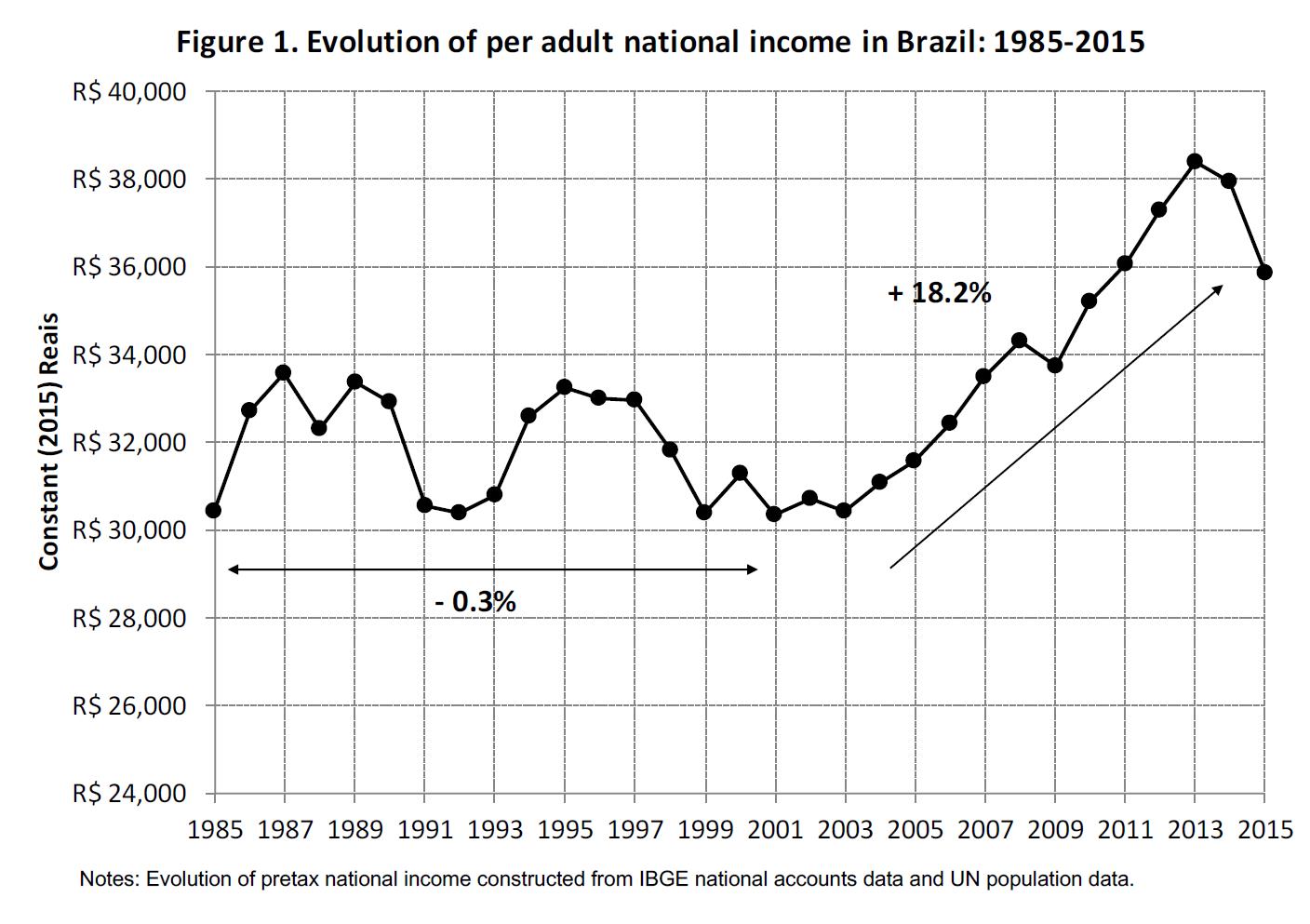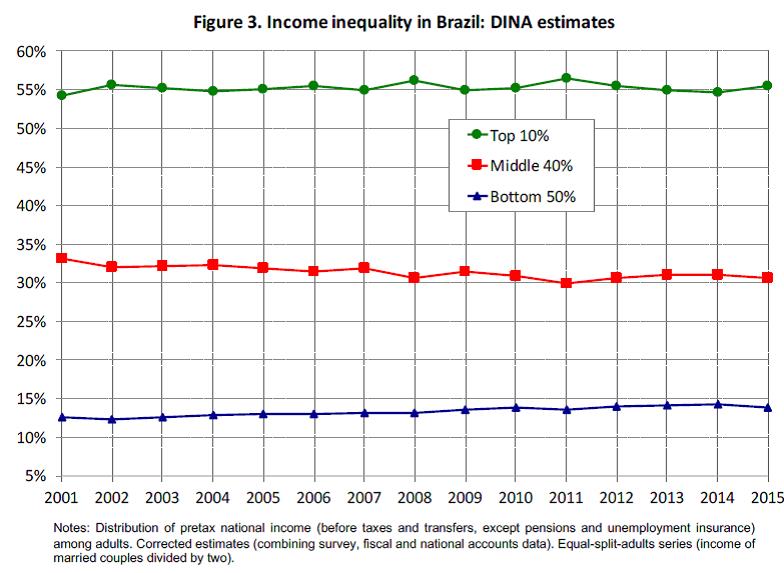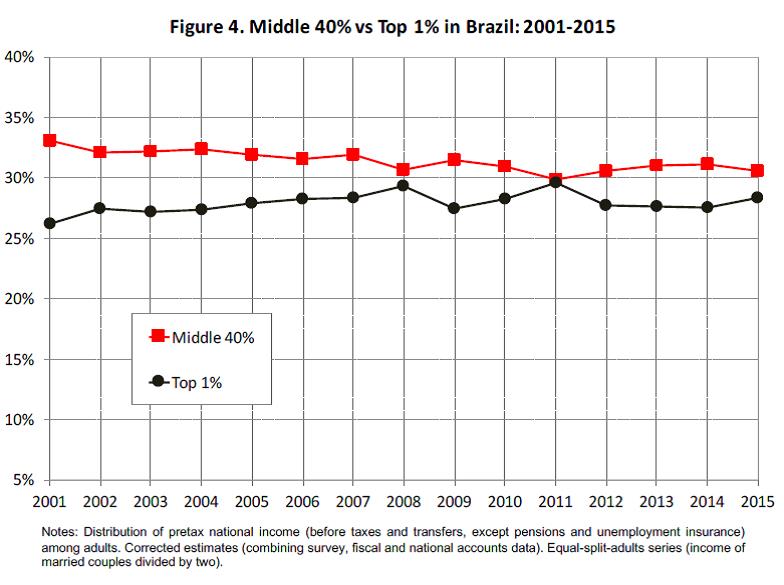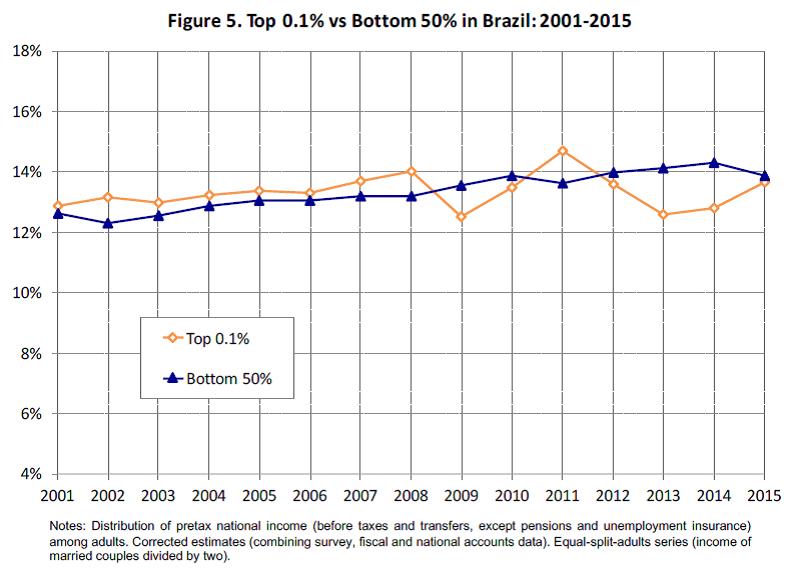In the United States, it was not until the mid 1960s that the former slaves finally obtained the right to sit in the same buses as whites, to go to the same schools and, at the same time, accede to the right to vote. In Brazil, the right to vote for the poor dates from the 1988 constitution, just a few years before the first multi-racial elections in South Africa in 1994. The comparison may shock: the population in Brazil is much more mixed than the two other countries. In 2010, in the last census, 48% of the population declared themselves to be ‘white’, 43% ‘mixed’, 8% ‘black’ and 1% ‘Asian’ or ‘natives’. In reality, more than 90% of Brazilians are of mixed origin. The fact remains that social and racial divisions are closely linked. While Brazil is not a country devoid of racism, it
Topics:
Thomas Piketty considers the following as important: in-english, Non classé
This could be interesting, too:
Thomas Piketty writes Regaining confidence in Europe
Thomas Piketty writes Trump, national-capitalism at bay
Thomas Piketty writes Democracy vs oligarchy, the fight of the century
Thomas Piketty writes For a new left-right cleavage

In the United States, it was not until the mid 1960s that the former slaves finally obtained the right to sit in the same buses as whites, to go to the same schools and, at the same time, accede to the right to vote. In Brazil, the right to vote for the poor dates from the 1988 constitution, just a few years before the first multi-racial elections in South Africa in 1994.
The comparison may shock: the population in Brazil is much more mixed than the two other countries. In 2010, in the last census, 48% of the population declared themselves to be ‘white’, 43% ‘mixed’, 8% ‘black’ and 1% ‘Asian’ or ‘natives’. In reality, more than 90% of Brazilians are of mixed origin. The fact remains that social and racial divisions are closely linked. While Brazil is not a country devoid of racism, it is sometimes described as the country of « cordial racism ». This is also a country where democracy is recent and fragile and at the moment is faced with a very serious crisis.
Brazil abolished slavery in 1888, at a time when the slaves still represented 30% of the population in some provinces, particularly in the sugar growing regions in the North East. Apart from the extreme case of slavery, this is a country where labour relations have long been extremely hard, in particular between the landowners and agricultural labourers or landless peasants. On the political level, the 1891 constitution was careful to specify that non-literate people would not have the right to vote, a rule that was also incorporated into the constitutions of 1934 and 1946. This permitted the exclusion of 70% of the adult population from the participation in the electoral process in 1890, and still over 50% in 1950 and 20% in 1980. In practice these were not only former slaves but more generally the poor who were thus excluded from the political scene for a century. In comparison, India had no hesitation in implementing genuine universal suffrage as from 1947, despite the huge social and status divisions inherited from the past and the immense poverty of the country.
In Brazil, despite the political exclusion of the illiterate no proactive education policy was implemented. The reason why inequality has remained so widespread in the country is primarily because the property-owning classes have never really attempted to reverse the heavy historical legacy. The quality of the public services and schools open to the majority has long remained extremely inadequate and is still insufficient today.
It was not until the end of the military dictatorship (1964-1985) and the 1988 constitution that voting rights were extended to all, with no educational stipulations. The first universal suffrage presidential election took place in 1989 and Lula, a former lathe operator, reached the second round and obtained 47% of the votes. His electoral success in 2002 with 61% of the votes in the second ballot, then his re-election in 2006 with the same score, – the candidate who had been ridiculed because of his lack of education and who was said not to be capable of representing the country abroad appropriately, marked the symbolic entry of Brazil into the era of universal suffrage. On the contrary, the election of Bolsonaro would signify a terrible regression and would go beyond the normal changeover following the new victories obtained by the Workers’ Party (PT) and Dilma Roussef (56% in 2010, 52% in 2014) with an electorate increasingly divided socially, racially and geographically (see this research by Amory Gethin on the evolution of electoral cleavages in Brasil).
The representative from Rio is a militarist, a macho and homophobic; he is also anti-social and anti-poor, as witness his ultraliberal economic programme. He also rides the wave of nostalgia for the reign of the white man, in a country where the ‘whites’ have now ceased to be the majority (they still accounted for 54% in the 2000 census). Given the questionable circumstances of the deposition of Roussef in 2016 and the obstruction of Lula in 2018, this election runs the risk of leaving dreadful traces.
When in power the PT put in a credible performance. Thanks to the rise in minimum wage and the new system of family allowances (Bolsa Familia), economic growth was accompanied by an unexpected fall in poverty. The PT also set up schemes for preferential access to the universities for the working classes and the black and mixed populations. But for lack of reform in the electoral system, the PT never succeeded in attacking the structural fiscal backwardness of the country (indirect taxes rise to 30% on electricity bills, whereas top inherited wealth is taxed at 4%). The result is that the reduction in inequality has been made at the expense of the middle classes and not the richest categories (see this research by Marc Morgan on the evolution of inequalities in Brasil, from which the figures reproduced on this post are extracted).
When the progressive forces have succeeded in reducing inequalities in the 20th century, it is because they fought for an ambitious, egalitarian agenda based on political reforms while at the same time implementing fiscal and social reforms. In the United States the 1913 constitution had to be amended to create a federal income and inheritance tax, which became the most progressive of its kind in history and enabled the financing of the New Deal. In the United Kingdom, the veto of the House of Lords had to be ended, and in France that of the Senate, failing which the social reforms in 1945 would never have seen the light of day. Today, the progressive forces refuse any sort of ambitious discussion on the democratisation of American, European or Brazilian institutions. However, it is not by leaving the monopoly of breaking with the past to the nativists or the reactionaries that equality and democracy will be saved.



